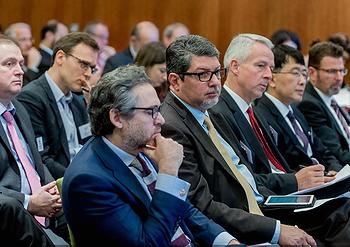
BERLIN, Germany, May 5, 2017 (ENS) – The clock cannot be rewound and globalization reversed, said Germany’s Federal Finance Minister Wolfgang Schäuble at the B20 Dialogue Forum in Berlin on Tuesday. Together we can shape it for the better, and the G20 is the most effective format in which to do that, he told his business audience.
“Nationalism and protectionism are never the right answer,” Schäuble said.
Federal Environment Minister Barbara Hendricks stressed at the B20 Dialogue Forum that sustainable economic activity was essential to achieving global prosperity.

The B20 was formed in 2010 as the official forum for business dialogue of the G20, or Group of Twenty, an international forum for the governments and central bank governors from 20 major economies. It was founded in 1999 with the aim of promoting high-level discussion of policy issues of international financial stability.
In its capacity as advisory body, the B20 supports the G20 when it comes to solving global challenges. The work of this international network is coordinated by business representatives of whatever country which holds the G20 Presidency, in this year, Germany.
Businessman Jürgen Heraeus is chair of Germany’s B20 Presidency, the motto of which is “Resilience, Responsibility, Responsiveness.”
On Wednesday the B20 handed over their policy recommendations to this year’s G20 President, Chancellor Angela Merkel, as part of an official ceremony in advance of the G20 summit to be held in Hamburg, Germany on July 7–8. Go to www.g20germany.de on 2 and 3 May for the live stream.
Minister Schäuble highlighted the danger in pursuing a policy of extremely cheap money.
Schäuble warned that the possibility of further financial turbulence could not be ruled out. We are still feeling the effects of the last financial crisis, he said, so countries now must boost their economic resilience. He said the central banks’ “exceptionally loose fiscal policies” carry new risks.
Schäuble said that more robust economies are needed, and he warned against the negative consequences of continuing the trend towards more trade protectionism.
Schäuble also stressed in his speech to the B20 Summit that the key rules introduced during the Lehman crisis could not be abandoned. Before declaring bankruptcy in 2008, Lehman was the fourth-largest investment bank in the United States.

Germany has made climate protection one of the priorities of its G20 Presidency.
“Individual nation states will not be able to solve global challenges,” Federal Environment Minister Barbara Hendricks stressed in her speech at the B20 Dialogue Forum. Sustainable economic activity is essential to achieving global prosperity, she said.
By adopting the Agenda 2030 for Sustainable Development and the Paris Climate Agreement, the nations of the world had committed themselves to climate and environmentally compatible economic activity, Hendricks said. This was driven by the binding common target of limiting global warming to less than two degrees Celsius.
Many sectors of the economy faced huge challenges as a result, she said. “We need to make sure that this structural change is a success without it causing any structural ruptures.”
She emphasized that climate compatible investment pays off. Businesses need reliable, long-term goals, said Hendricks. They lay the foundation for climate compatible investments that pay off.
Environmentally compatible criteria are just as important for new investments, the Environment Minister said. One good example is climate compatible power generation.
“Climate action and environmental protection are a massive programme of modernisation for our economies and will have a positive impact on competitiveness, the labor market, social inclusion and political stability,” Hendricks stressed.
Germany wants to promote the issue of resource efficiency in close collaboration with the G20, said Hendricks, saying, “The strong support of the B20 and the many positive reactions from those in the G20 family show me that it was right, even long-overdue, that we put this topic on the G20 agenda.”
That is why the upcoming G20 Summit in Hamburg under Germany’s Presidency is to send a clear signal of the Group of 20’s strong commitment to climate action and implementing the 2030 Agenda for Sustainable Development.
Hendricks said, “Good policies can only succeed if we work hand in hand with entrepreneurs, with civil society and the scientific community.”
The members of the G20 are Argentina, Australia, Brazil, Canada, China, France, Germany, India, Indonesia, Italy, Japan, Republic of Korea, Mexico, Russia, Saudi Arabia, South Africa, Turkey, the United Kingdom, the United States and the European Union.
Copyright Environment News Service (ENS) 2017. All rights reserved.
© 2017, Environment News Service. All rights reserved. Content may be quoted only with proper attribution and a direct link to the original article. Full reproduction is prohibited.
